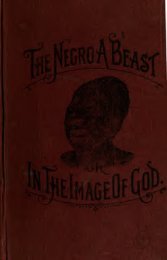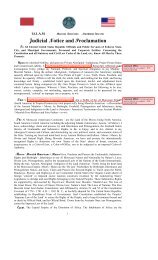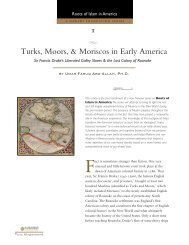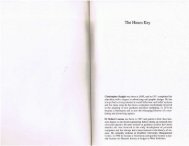Christian Slavery - Bad News About Christianity
You also want an ePaper? Increase the reach of your titles
YUMPU automatically turns print PDFs into web optimized ePapers that Google loves.
If a free man has unknowingly contracted with a slave girl, and did not consent when he discovered this,<br />
the matrimony may be put asunder, and he can contract with another.<br />
Innocent III to Bishop H.<br />
You know that it has come to our hearing that our beloved son G., the cardinal priest under the title of<br />
Santa Maria in Trastevere, legate of the Apostolic See, separated our beloved son R., a nobleman and<br />
knight, from a certain woman because of an error about her condition.<br />
By apostolic decree, therefore, we command Your Fraternity: Carefully investigate the truth of this matter<br />
and, if it is clear to you that this knight contracted with the slave girl unknowingly and, afterwards, when he<br />
understood her condition, did not consent to her by word or deed (the reason their union was put asunder<br />
by the cardinal), you may, by apostolic authority, grant him permission to contract with another woman.<br />
Notes<br />
1 The Authorised Version invariably uses the word servant where the natural translation is slave. Most modern translations<br />
use the word slave (a more accurate rendering of the Hebrew "ebhedh, Greek doulos) — masters buy and sells slaves not<br />
servants.<br />
2. Ignatius's letter to Polycarp 4. See Andrew Louth (ed.), Maxwell Staniforth (trans.) Early <strong>Christian</strong> Writings, p 110.<br />
3. St Augustine, City of God, Book XIX, Chapter 15.<br />
4. Fox, Pagans and <strong>Christian</strong>s, p 298, citing G Sotgiu, Arch. Class. 25/6 (1973-4) 688. Felix's collar was an inscribed<br />
bronze collarof the late fifth or early sixth century AD, worn by a slave of the <strong>Christian</strong> archdeacon in Sardinia, reproduced<br />
in G H R Horsley (ed), New Documents illustrating Early <strong>Christian</strong>ity (Macquarie University, North Ryde, New South<br />
Wales, 1981, pp 140-141. The inscription runs S[ervus sum] Felicis ar[ch]idiac[oni]: tene me ne fugiam, translated into<br />
English: "I am a slave of Felix the archdeacon: hold me lest I run away", Frederick Fyvie Bruce, The Epistles to the<br />
Colossians, to Philemon, and to the Ephesians, William. B. Eerdmans Publishing, Michigan 1984, p 198.<br />
5. Kyle Harper, <strong>Slavery</strong> in the Late Roman World, AD 275-425, Cambridge University Press, p 258.<br />
6. Ibid, p 258.<br />
7. Ibid, p 258.<br />
8. Ibid, p 259<br />
9. Keith Bradley, <strong>Slavery</strong> and Society at Rome, Cambridge University Press, p 148, citing the longer monastic rules of<br />
Basil, Bishop of Caesaria, in the 370's<br />
10. Kyle Harper, <strong>Slavery</strong> in the Late Roman World, AD 275-425, Cambridge University Press, p 259<br />
11. Kyle Harper, <strong>Slavery</strong> in the Late Roman World, AD 275-425, Cambridge University Press, p 258<br />
12. Kyle Harper, <strong>Slavery</strong> in the Late Roman World, AD 275-425, Cambridge University Press, p 498<br />
13. Kyle Harper, <strong>Slavery</strong> in the Late Roman World, AD 275-425, Cambridge University Press, p 498, citing Greg Mag Ep<br />
6:10<br />
14. Kyle Harper, <strong>Slavery</strong> in the Late Roman World, AD 275-425, Cambridge University Press, p 498, citing Greg Mag Ep<br />
9:124}<br />
15. Decretum gratiani, Case. 32: Misuse of Marriage q. 3: Marriage of Slaves.<br />
16. The fuller relevant passages are:<br />
Let matrimony be put asunder when a free man has unknowingly contracted with a slave girl, unless he<br />
had relations with her after discovering this.<br />
Alexander the III to the Guardian and Prior of Mortari.<br />
The woman M., the bearer of the present letter, set out to us that, after her husband had lived with her a<br />
long time, he objected to the blemish of her servile condition and asserted that she was a slave, and that<br />
he thought she was free when he took her as wife.<br />
This matter was treated before our venerable brother, the bishop of Asti, and the woman, who feared that<br />
she would be injured there, appealed to our hearing. After a short delay this man withdrew the lawsuit he<br />
had initiated. Both are alive. Therefore, by apostolic decree, we command Your Discretion, since you have<br />
inquired concerning this: Summon the parties before you and carefully investigate the truth of this matter.<br />
If it is clear to you that this man knew the woman carnally after he heard she was a slave, admonish him<br />
and compel him to take her and treat her as his wife with marital affection. But if this is not the case, and a<br />
decree of divorce is to be given, have restitution made to the woman of the money she gave the said man<br />
in dowry, as this is just. (Decretals of Gregory IX, Book Four, The Marriage of Slaves, C. 2)
















